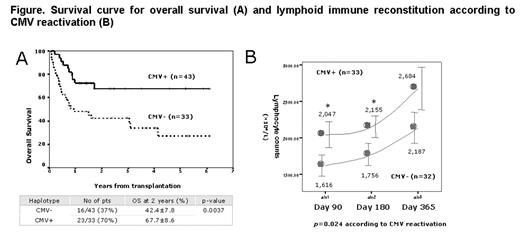Abstract
Background: Cytomegalovirus (CMV) reactivation (CMV-R) is associated with increased morbidity after allogeneic stem cell transplantation (SCT). However, after the introduction of ganciclovir preemptive therapy, CMV-R can be successfully controlled if the recipient’s immunity recovers. Although many investigations have already focused on CMV-R as a risk factor, data related to the impact of asymptomatic CMV-R on transplant outcomes is scarce. Accordingly, the present study analyzed the differences in the transplant outcomes the immune reconstitution according to the CMV-R after allogeneic PBSCT.
Method: A total of 76 patients undergoing allogeneic peripheral blood stem cell transplantation (PBSCT) were included in the current study. The transplant outcomes and immune reconstitution after 3, 6, and 12 months were analyzed according to the occurrence of CMV-R in 33 patients.
Result: The analysis revealed a favorable prognosis for the group with CMV-R compared to those without CMV-R: p=0.0037 for OS, p=0.0204 for NRM, and p=0.05 for the risk of relapse. CMV-R was also found to correlate to the lymphoid reconstitution (p=0.024). In multivariate analyses, CMV-R was found to be a favorable prognostic factor in terms of OS (p=0.010, hazard ratio [HR] 2.948) and NRM (p=0.05, HR 2.665), along with a higher transplant CD34+ cell dose (p=0.003 for OS, p=0.002 for NRM), standard risk (p=0.023 for OS), and acute GVHD grade 0~2 (p=0.007 for NRM).
Conclusion: In a PBSCT setting, CMV-R did not seem to be a poor prognostic factor in terms of OS and NRM, possibly due to the accelerated lymphoid immune reconstitution associated with CMV-R.
Survival curve for overall survival (A) and lymphoid immune reconstitution according to CMV reactivation (B)
Survival curve for overall survival (A) and lymphoid immune reconstitution according to CMV reactivation (B)
Author notes
Corresponding author


